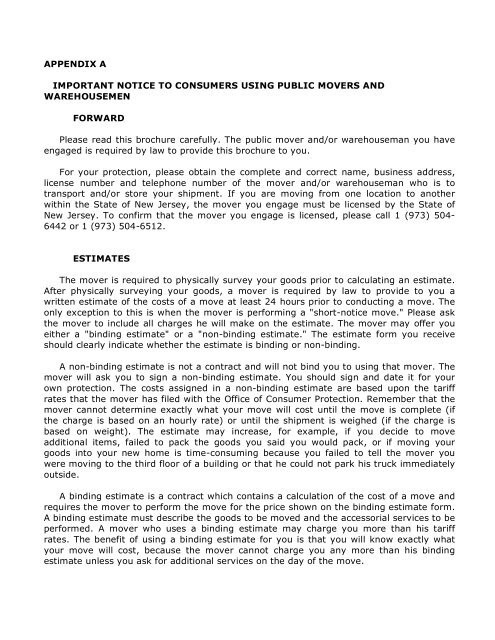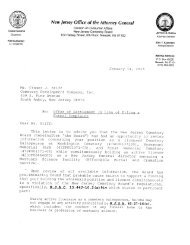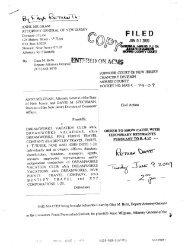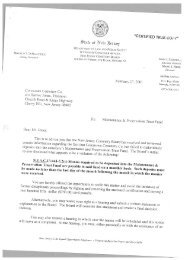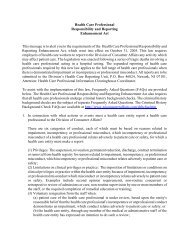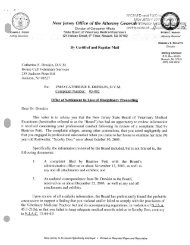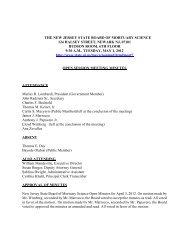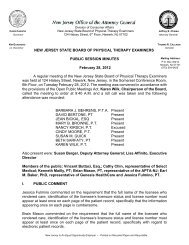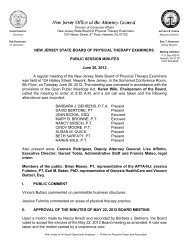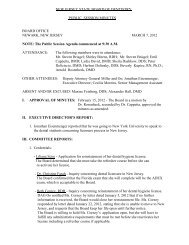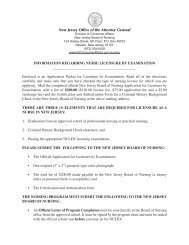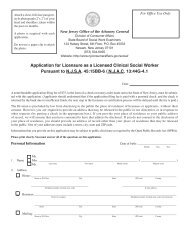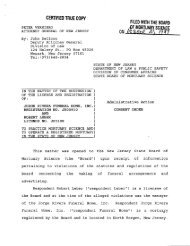Important Notice to Consumers Using Public Movers and ...
Important Notice to Consumers Using Public Movers and ...
Important Notice to Consumers Using Public Movers and ...
Create successful ePaper yourself
Turn your PDF publications into a flip-book with our unique Google optimized e-Paper software.
APPENDIX A<br />
IMPORTANT NOTICE TO CONSUMERS USING PUBLIC MOVERS AND<br />
WAREHOUSEMEN<br />
FORWARD<br />
Please read this brochure carefully. The public mover <strong>and</strong>/or warehouseman you have<br />
engaged is required by law <strong>to</strong> provide this brochure <strong>to</strong> you.<br />
For your protection, please obtain the complete <strong>and</strong> correct name, business address,<br />
license number <strong>and</strong> telephone number of the mover <strong>and</strong>/or warehouseman who is <strong>to</strong><br />
transport <strong>and</strong>/or s<strong>to</strong>re your shipment. If you are moving from one location <strong>to</strong> another<br />
within the State of New Jersey, the mover you engage must be licensed by the State of<br />
New Jersey. To confirm that the mover you engage is licensed, please call 1 (973) 504-<br />
6442 or 1 (973) 504-6512.<br />
ESTIMATES<br />
The mover is required <strong>to</strong> physically survey your goods prior <strong>to</strong> calculating an estimate.<br />
After physically surveying your goods, a mover is required by law <strong>to</strong> provide <strong>to</strong> you a<br />
written estimate of the costs of a move at least 24 hours prior <strong>to</strong> conducting a move. The<br />
only exception <strong>to</strong> this is when the mover is performing a "short-notice move." Please ask<br />
the mover <strong>to</strong> include all charges he will make on the estimate. The mover may offer you<br />
either a "binding estimate" or a "non-binding estimate." The estimate form you receive<br />
should clearly indicate whether the estimate is binding or non-binding.<br />
A non-binding estimate is not a contract <strong>and</strong> will not bind you <strong>to</strong> using that mover. The<br />
mover will ask you <strong>to</strong> sign a non-binding estimate. You should sign <strong>and</strong> date it for your<br />
own protection. The costs assigned in a non-binding estimate are based upon the tariff<br />
rates that the mover has filed with the Office of Consumer Protection. Remember that the<br />
mover cannot determine exactly what your move will cost until the move is complete (if<br />
the charge is based on an hourly rate) or until the shipment is weighed (if the charge is<br />
based on weight). The estimate may increase, for example, if you decide <strong>to</strong> move<br />
additional items, failed <strong>to</strong> pack the goods you said you would pack, or if moving your<br />
goods in<strong>to</strong> your new home is time-consuming because you failed <strong>to</strong> tell the mover you<br />
were moving <strong>to</strong> the third floor of a building or that he could not park his truck immediately<br />
outside.<br />
A binding estimate is a contract which contains a calculation of the cost of a move <strong>and</strong><br />
requires the mover <strong>to</strong> perform the move for the price shown on the binding estimate form.<br />
A binding estimate must describe the goods <strong>to</strong> be moved <strong>and</strong> the accessorial services <strong>to</strong> be<br />
performed. A mover who uses a binding estimate may charge you more than his tariff<br />
rates. The benefit of using a binding estimate for you is that you will know exactly what<br />
your move will cost, because the mover cannot charge you any more than his binding<br />
estimate unless you ask for additional services on the day of the move.
When a mover is performing a short-notice move, he is still required by law <strong>to</strong><br />
physically survey your goods <strong>and</strong> provide a written estimate. The mover is not, however,<br />
required <strong>to</strong> provide this estimate 24 hours prior <strong>to</strong> the move. A mover performing a shortnotice<br />
move may provide an estimate on the day of the move. A short-notice move may<br />
only be performed if you have been evicted <strong>and</strong> you need <strong>to</strong> move your property within 24<br />
hours of the eviction, your residence or office has been damaged by fire <strong>and</strong> you need <strong>to</strong><br />
move your property within 24 hours of the fire, you contracted with another mover <strong>and</strong> he<br />
didn't arrive or the <strong>to</strong>tal cost <strong>to</strong> you for the move does not exceed $ 500.00. The mover is<br />
required <strong>to</strong> follow all other statutes <strong>and</strong> regulations regarding moving when providing a<br />
short-notice move. A mover performing a short-notice move will offer you either a binding<br />
estimate or a non-binding estimate; these estimates are identical <strong>to</strong> estimates given under<br />
normal circumstances, except they do not need <strong>to</strong> be provided 24 hours prior <strong>to</strong> the move.<br />
MOVER'S RESPONSIBILITY FOR LOSS AND DAMAGE<br />
Unless you have additional insurance, the mover is, in most cases, only required <strong>to</strong><br />
reimburse you for any damages <strong>to</strong> your belongings at the rate of $ .60 per pound. For<br />
example, if you have a vase valued at $ 1,000 but it only weighs two pounds, the mover<br />
is, in most cases, only required <strong>to</strong> reimburse you the sum of $ 1.20. For your own<br />
protection, consider discussing with your insurance agent whether you should purchase<br />
additional insurance from the mover or confirm that an existing insurance policy would<br />
protect your goods in transit or s<strong>to</strong>rage. If you decide <strong>to</strong> purchase insurance through the<br />
mover, the mover must issue you a certificate of insurance (sometimes called "an advice of<br />
coverage") as proof or purchase which must be fully completed with all the policy's terms.<br />
When purchasing insurance, consider:<br />
1. Whether <strong>to</strong> insure for actual or replacement value. For example, if you purchased a<br />
sofa in 1996 for $ 500.00, do you want <strong>to</strong> insure it at actual value ($ 500.00) or<br />
replacement value (probably a higher figure).<br />
2. Whether you want <strong>to</strong> insure for the <strong>to</strong>tal valuation of your shipment. For example, if<br />
your <strong>to</strong>tal shipment value is $ 50,000, <strong>and</strong> you only take out $ 25,000 in insurance, you<br />
will only receive half the value of any damaged item.<br />
LOST OR DAMAGED ARTICLES<br />
Be sure <strong>to</strong> check your goods as they are delivered. You should note any lost articles or<br />
damages on the bill of lading which you will sign on completion of the delivery. If you<br />
discover other loss or damage report this <strong>to</strong> your mover immediately because the mover is<br />
not required by law <strong>to</strong> h<strong>and</strong>le claims made more than 90 days after the move. If you<br />
suspect your goods have been s<strong>to</strong>len, you should report this <strong>to</strong> the police immediately.
BILL OF LADING<br />
Before your shipment leaves the point of origin, you should obtain from the public<br />
mover a bill of lading signed by you <strong>and</strong> the public mover. Be sure that this shows the<br />
public mover's name, address, license number <strong>and</strong> telephone number at which you can<br />
reach the public mover, <strong>and</strong> an address <strong>and</strong> telephone number furnished by you <strong>to</strong> which<br />
the public mover can send messages regarding your shipment while it is in his possession,<br />
the location from <strong>and</strong> <strong>to</strong> which your goods are moving, the date of loading, date of<br />
delivery, s<strong>to</strong>rage instructions (if any) <strong>and</strong> the declared or released valuation of the goods.<br />
The bill of lading will list all the actual charges you have <strong>to</strong> pay for services rendered by<br />
the mover.<br />
HOURLY MOVES<br />
If the public mover's rates are determined by the hour, the mover will require you <strong>to</strong><br />
sign for the start <strong>and</strong> finish time of the actual working hours (subject <strong>to</strong> the mover's<br />
minimum number of hours). You will note <strong>and</strong> initial on the bill of lading the time your<br />
truck arrives at your origin <strong>and</strong> again note <strong>and</strong> initial the time the men deliver the last<br />
piece in<strong>to</strong> your new residence. To this time you will add the appropriate travel time, if<br />
travel time is applicable, <strong>and</strong> deduct for time spent by the movers for lunch or for time<br />
spent for any breakdown of the vehicle, <strong>and</strong> for any time spent in excess of normal for the<br />
truck being "lost" en route <strong>to</strong> your new residence. Any accessorial charges will be in<br />
addition <strong>to</strong> the hourly charges.<br />
WEIGHT MOVES<br />
If the public mover's transportation charges are determined on the basis of weight of<br />
your shipment <strong>and</strong> miles traveled, the public mover will weigh its empty vehicle prior <strong>to</strong><br />
the loading of your goods. This weight will be the TARE WEIGHT. After loading your goods,<br />
the vehicle will again be weighed <strong>and</strong> this is the GROSS WEIGHT. The difference between<br />
the GROSS WEIGHT <strong>and</strong> the TARE WEIGHT is the NET WEIGHT. The NET WEIGHT is the<br />
weight for which you will pay transportation charges. If your shipment weighs less than<br />
1,000 pounds, the mover may weigh it prior <strong>to</strong> loading by using a portable scale or use an<br />
estimated weight based on cubic feet. Some movers may have minimum weight<br />
requirements. The weight tickets obtained by the mover must have a seal on them<br />
showing that the truck scale used is approved by the NJ Bureau of Weights <strong>and</strong> Measures.<br />
You are permitted <strong>to</strong> follow the loaded truck <strong>to</strong> the weigh station <strong>to</strong> view your weighing.<br />
PAYMENT AND DELIVERY<br />
The mover usually requires payment in cash, money order or certified check. Check<br />
with your mover when he performs the physical survey of your goods as <strong>to</strong> what form of<br />
payment he requires so that you are prepared <strong>to</strong> pay on the day of the move. Unless you<br />
<strong>and</strong> your mover agreed <strong>to</strong> a binding estimate, the mover may charge you more than his<br />
estimate; you should be prepared <strong>to</strong> pay more than the estimate.
PREPARING ARTICLES FOR SHIPMENT<br />
Some articles such as s<strong>to</strong>ves, refrigera<strong>to</strong>rs, washing machines, computers, copiers, <strong>and</strong><br />
other electronic devices, may require disconnection <strong>and</strong> usually special servicing <strong>to</strong> protect<br />
their mechanisms during shipment. Similarly, some items, such as pool tables <strong>and</strong><br />
gr<strong>and</strong>father clocks, may need special h<strong>and</strong>ling <strong>to</strong> protect them during shipments. It is your<br />
responsibility <strong>to</strong> have this done. Some public movers, upon request, will arrange <strong>to</strong> have<br />
this service done at your expense. You should arrange <strong>to</strong> take down all blinds, draperies,<br />
window cornices, mirrors, <strong>and</strong> other items attached <strong>to</strong> the walls, <strong>and</strong> <strong>to</strong> take up carpets<br />
which are tacked down. The charge for such service is not included in the transportation<br />
charge <strong>and</strong> may be performed by the public mover only at an extra per-hour charge. The<br />
mover should be advised prior <strong>to</strong> your moving date that these services are needed. Under<br />
no circumstances should you pack jewelry, money, valuable papers or items of sentimental<br />
value with your other belongings, or pack any matches, flammables, perishables, or other<br />
dangerous articles. The mover will not be responsible for these items should they be<br />
transported without his knowledge.<br />
PACKING<br />
You may pack your own belongings in<strong>to</strong> boxes, crates, etc. or you may have the mover<br />
pack your goods for you. Please remember that the mover is not responsible for damage <strong>to</strong><br />
any goods you pack yourself. The mover can also refuse <strong>to</strong> transport goods you have<br />
packed yourself if he feels he cannot transport them safely. When the mover performs the<br />
physical survey, make sure you ask whether the charge for packing <strong>and</strong> unpacking are<br />
included in the price. If you decide <strong>to</strong> pack your goods yourself, remember that the mover<br />
will charge you more than the estimate if you fail <strong>to</strong> pack all your goods in time <strong>and</strong> the<br />
mover has <strong>to</strong> do this for you.<br />
TARIFFS<br />
Every mover must file a document containing his rates charges <strong>and</strong> rules called a<br />
"tariff" with the State. Tariffs are open <strong>to</strong> public inspection <strong>and</strong> you may examine them at<br />
the mover's office or the Office of Consumer Protection, by appointment, during normal<br />
business hours. The mover may only require you <strong>to</strong> pay his charges as listed in the tariff<br />
with 2 exceptions: (1) he may always charge you less than his tariff; <strong>and</strong> (2) he may<br />
charge more than his tariff if you have agreed in advance <strong>to</strong> a binding estimate. No mover<br />
may impose a charge unless it is listed in his tariff. Such charges may include packing <strong>and</strong><br />
unpacking, providing boxes <strong>and</strong> packing materials, specific charges for large or heavy<br />
items such as pianos or snowmobiles.<br />
<strong>Public</strong> <strong>Movers</strong> <strong>and</strong> Warehousemen are regulated by the Office of Consumer Protection,<br />
124 Halsey Street, PO Box 5028, Newark, NJ 07101. If you have a question concerning the<br />
mover or warehouseman, or wish <strong>to</strong> lodge a complaint, please call 1 (973) 504-6442 or 1<br />
(973) 504-6512. You may also visit the Office of Consumer Protection's website at<br />
www.state.nj.us/lps/ca/ocp.htm.
GLOSSARY OF MOVING TERMINOLOGY<br />
"Bill of lading" means a receipt given <strong>to</strong> a consumer by the public mover for all of the<br />
cargo picked up from the consumer by the public mover <strong>and</strong> moved <strong>to</strong> another point.<br />
"Binding estimate" means a contract which contains a calculation of the cost of a move<br />
made after the mover has made a physical survey which clearly describes the goods <strong>to</strong> be<br />
moved <strong>and</strong> the accessorial services <strong>to</strong> be performed <strong>and</strong> which binds the mover <strong>to</strong> the<br />
charges shown on the binding estimate form.<br />
"Non-binding estimate" means an approximation made by the public mover <strong>and</strong>/or<br />
warehouseman of the cost of the shipment <strong>and</strong>/or s<strong>to</strong>rage made after a physical survey.<br />
"Order for Service" means the contract which the consumer receives from a public<br />
mover <strong>and</strong>/or warehouseman at least 24 hours prior <strong>to</strong> the move with a non-binding<br />
estimate.<br />
"Short-notice move" means performing a move on the same day that a consumer<br />
requests services from a public mover <strong>and</strong>/or warehouseman.<br />
"Tariff" means a schedule of the rates, charges, classification ratings, terms <strong>and</strong><br />
conditions of the public mover <strong>and</strong>/or warehouseman.<br />
"Warehouse receipt" means a receipt given <strong>to</strong> a consumer by a warehouseman for all of<br />
the consumer's goods s<strong>to</strong>red in the warehouseman's facility.


